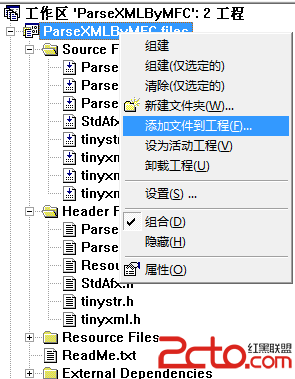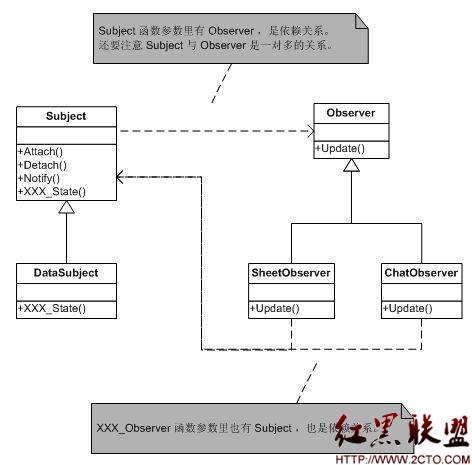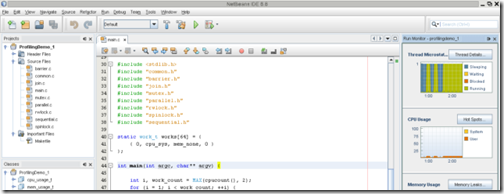裸指针和智能指针的性能对比
本文比较了裸指针和智能指针的性能1.unique_ptr与queue连用,unique_ptr的使用特点:不能使用拷贝构造函数,拷贝赋值函数,但是可以使用move构造函数和move赋值函数。
2.std::move的使用,可以将左值表达式强制转化成为右值表达式
3. 重载new操作符调试内存使用情况,因为心里不是很放心(智能指针真的为我释放了内存么?)所以尝试了重写new delete操作符。
4. 得到的结果是raw_ptr:unique_ptr:shared_ptr的性能是5:7:11,可见智能指针的效率还是相当诱人。
#include <iostream>
#include <memory>
#include <Windows.h>
#include <queue>
#include <Psapi.h>
using namespace std;
static size_t s_my_int_count = 0;
const int MAX_LOOP_ = 3000000;
const int NORMAL_FLAG = 0x12ff0101;
const int MY_INT_FLAG = 0x12ff0102;
void* operator new(std::size_t size)throw(std::bad_alloc)//重写new操作符为的是统计我们关心的内存分配
{
int addLen = sizeof(size_t);
void * p = std::malloc(addLen + 4 + size) ;
if (!p)
throw std::bad_alloc() ;
memcpy(p, &size, addLen);//标志实际长度
memcpy((char*)p + addLen, &NORMAL_FLAG, 4);//标志类型,普通---0x12ff0101, 我自己的int---0x12ff0102, 我自己的char[]---0x12ff0103
return ((char*)p + addLen + 4);
}
void* operator new(std::size_t size, int flag)throw(std::bad_alloc)// 对应于调用 “new(MY_INT_FLAG) int” 这样所有我们关心的内存多可以被监视
{
int addLen = sizeof(size_t);
void * p = std::malloc(addLen + 4 + size) ;
if (!p)
throw std::bad_alloc() ;
if (flag == MY_INT_FLAG){
s_my_int_count ++;//统计关心的内存申请次数
}
memcpy(p, &size, addLen);//标志实际长度
memcpy((char*)p + addLen, &flag, 4);//放置标志位,标志类型,普通---0x12ff0101, 我自己的int---0x12ff0102, 我自己的char[]---0x12ff0103
return ((char*)p + addLen + 4);
}
void operator delete(void * q) throw()
{
void* p;
int addLen = sizeof(size_t);
p = (char*)q - addLen - 4;//还原原来的指针位置,p是真正的系统malloc出来的指针
int flag;
memcpy(&flag, (char*)p + addLen, 4);//得到标志位
if (flag == MY_INT_FLAG){//统计关心的内存释放次数
s_my_int_count --;
}
if (p)
std::free(p) ;
}
void main(){
queue<int*> intQueue;
int count = 0;
count = 0;
cout << "before push " << s_my_int_count << " int allocated"<< endl;
LONGLONG start = GetTickCount();
for (int i = 0; i < MAX_LOOP_; i ++)
{
int* p = new(MY_INT_FLAG) int;
intQueue.push(p);
}
cout << "after push " << s_my_int_count << " int allocated"<< endl;
while (!intQueue.empty()){
int* p = intQueue.front();
intQueue.pop();
delete p;//注意需要手动释放
count ++;
}
cout << "after pop " << s_my_int_count << " int allocated"<< endl;
cout << "===================raw int ptr for " << count << "\t" << GetTickCount() - start << endl;
unique_ptr<int> q(new int);
unique_ptr<int> r = move(q);// 编译正确,r(q) 和 r = q则编译失败,因为unique_ptr已经不允许使用“拷贝构造函数”
queue<unique_ptr<int>> intUniQueue;//因为unique_ptr没有“拷贝构造函数” copy-constructor
//所以push()的参数不能是“左值”,左值会调用“拷贝构造函数”
//只能是“右值”,右值则会调用“移动构造函数” move-constructor,
//std::move()函数可以强制将左值转化成为右值
count = 0;
start = GetTickCount();
cout << "before push " << s_my_int_count << " int allocated"<< endl;
for (int i = 0; i < MAX_LOOP_; i ++)
{
unique_ptr<int> p(new(MY_INT_FLAG) int);
intUniQueue.push(std::move(p));//因为p不是“右值”,所以我们需要“显式”的调用move将p强制转为右值。
}
cout << "after push " << s_my_int_count << " int allocated"<< endl;
while (!intUniQueue.empty()){
unique_ptr<int> p = std::move(intUniQueue.front());//queue.front() 是一个左值引用,即queue.front()=2 合法。
intUniQueue.pop();
count ++;
}
cout << "after pop " << s_my_int_count << " int allocated"<< endl;
cout << "===================int unique ptr for " << count << "\t" << GetTickCount() - start << endl;
queue<shared_ptr<int>> intSharedQueue;
count = 0;
start = GetTickCount();
cout << "before push " << s_my_int_count << " int allocated"<< endl;
for (int i = 0; i < MAX_LOOP_; i ++)
{
shared_ptr<int> p(new(MY_INT_FLAG) int);
intSharedQueue.push(p);
}
cout << "after push " << s_my_int_count << " int allocated"<< endl;
while (!intSharedQueue.empty()){
auto p = intSharedQueue.front();
intSharedQueue.pop();
count ++;
}
cout << "after pop " << s_my_int_count << " int allocated"<< endl;
cout << "===================int shared ptr for " << count << "\t" << GetTickCount() - start << endl;
}
/*
智能指针省去了我们释放指针的精力,但是也需要一定的开销。unique_ptr 的开销相对于shared_ptr要小很多。
如果一个资源每个时刻都只要有一个支配者,我们还是优先使用unique_ptr吧,效率会高很多。
before push 0 int allocated
after push 3000000 int allocated
after pop 0 int allocated
===================raw int ptr for 3000000 5375
before push 0 int allocated
after push 3000000 int allocated
after pop 0 int allocated
===================int unique ptr for 3000000 7313
before push 0 int allocated
after push 3000000 int allocated
after pop 0 int allocated
===================int shared ptr for 3000000 11171
请按任意键继续. . .
*/
补充:软件开发 , C++ ,




